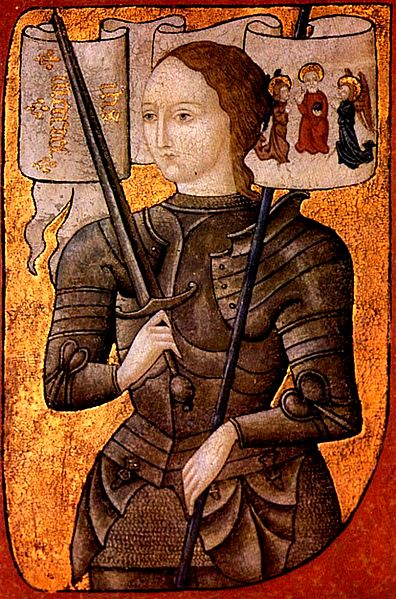
The last play that we saw at the Utah Shakespeare Festival in Cedar City was the rarely performed Henry VI Part One. It is, I think, typically written off as one of the lesser of Shakespeare’s plays, and I’m told that some even doubt its Shakespearean authorship. To the best of my recollection, I’ve never seen Henry VI Part One before, although I may have. In any event, I wasn’t expecting too terribly much.
But I was entirely pleased, and both my wife and I thoroughly enjoyed it. Among its interesting features is its depiction of St. Jeanne d’Arc (Joan of Arc, also known as La Pucelle d’Orléans or “The Maid of Orléans,” whose brief but spectacular life lasted only from AD 1412 to 1431), from an understandably rather hostile English point of view.

(Wikimedia Commons public domain)
I need to spend more time studying about Joan. I’ve been interested in her for a long time, and, a year or two ago, visited the place of her execution. Back in 2006, I enjoyed and was fascinated by a play that was written and produced at BYU, by Melissa Leilani Larson, that I now need to sit down and read. It was titled Angels Unaware: A Story of Joan of Arc, and I found it theologically intriguing. See, on it,
“Angels in the battlefield: BYU production tackles Joan of Arc story”
I also very much liked BYU-TV’s docudrama production, Joan of Arc. On which, see
“BYUtv Premieres Docudrama Joan of Arc: A Story of Spiritual Power and Angelic Visitations”
High on my list of things to read, too, is Mark Twain’s little-remembered 1896 novel Personal Recollections of Joan of Arc, by the Sieur Louis de Conte. It’s quite an unexpected book, coming, as it does, from the author of Huckleberry Finn and Tom Sawyer, who was usually a cynic and, most likely, an agnostic. I’m told that it lacks his usual sardonic attitude and that little if any of his remarkable sense of humor comes through in it.
Twain himself had a high opinion of the work:
I like Joan of Arc best of all my books; and it is the best; I know it perfectly well. And besides, it furnished me seven times the pleasure afforded me by any of the others; twelve years of preparation, and two years of writing. The others needed no preparation and got none.
I’ve seen claims that, on certain surveys or questionnaires, people commonly misidentify Joan of Arc — this is really rather funny, bust also more than a bit sad — as the wife of the biblical Noah.
From what I know of her, she deserves much more than that.












